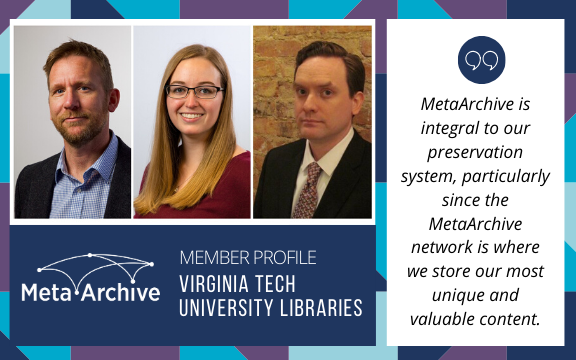MetaArchive Member Profile: Virginia Tech University Libraries
April 15, 2020
By: Alex Kinnaman, Digital Preservation Coordinator, and Nathan Hall, Director of Digital Imaging and Preservation

Tell us a bit about the digital preservation program at your organization?
Virginia Tech University Libraries was a founding member of the MetaArchive Cooperative and has hosted a LOCKSS cache since 2007. Our preservation system has evolved since then, including the addition of a second distributed digital preservation service with APTrust, the hiring of two digital preservation faculty members in 2017, and the ongoing development of a preservation-centric Digital Library Platform. The preservation system is managed by the Director of Digital Imaging and Preservation Services, the Digital Preservation Coordinator, and the Digital Preservation Technologist, and it is implemented by the Digital Library Development team in the Library. This group is responsible for developing and maintaining policies, overseeing workflows, and collaborating with our content producers. We are currently working on our Digital Preservation Program Priorities and Deliverables, outlining policies, services, and automations to be integrated with our new platform in development.
Looking ahead, what are you excited about, or what’s on the horizon for your program?
We have recently received a grant to digitize the Virginia Tech Insect Collection in 3D using photogrammetry in collaboration with the Entomology Department. 3D objects are complex and dynamic objects that present a preservation challenge, and we are investigating how our preservation workflow for these objects will differ from workflows for simpler objects. We are also developing a more robust Digital Humanities support system in the Libraries and are collaborating with VT Publishing to develop preservation levels for the variety of DH projects we hope to host. Ultimately, we are excited to have an automated preservation system built into the Digital Library Platform that communicates directly with MetaArchive.

L-R: Nathan Hall, Director of Digital Imaging and Preservation; Alex Kinnaman, Digital Preservation Coordinator; and Luke Menzies, Digital Preservation Technologist
Tell us a bit about your local workflow. How has the MetaArchive preservation storage service been incorporated?
Our current workflows are under revision as our new Digital Library Platform is in its beta form. In the past we performed our MetaArchive ingests manually; we are working on a MetaArchive Automation Service to better streamline our preservation system. MetaArchive currently holds all of our digitized bound theses and dissertations prior to 2017. While we have not ingested content into MetaArchive during our preservation system development, we have maintained an active role in hosting our cache and staying active within the community.
Tell us about your experience in participating in the MetaArchive community. How has it influenced you or your work?
Virginia Tech University Libraries has been an active member in MetaArchive since 2004, both as a cache host and in the community, including Steering Committee participation, and committee participation. The Change for Continued Impact Series has enabled us to engage more in the community and offer feedback. We have often relied on this community for advice or discussion in making our preservation decisions. MetaArchive is integral to our preservation system, particularly since the MetaArchive network is where we store our most unique and valuable content.
Tell us a bit about your experience participating in the Changing for Continued Impact Series? What have been some of your key takeaways from the series thus far?
We have been active in the Changed for Continued Impact Series, and appreciate the expanded interest in community needs and comprehensive engagement. One of the most valuable outcomes thus far has been the MetaArchive-LOCKSS Sustainability Evaluations provided by Penn State and Cal Poly, as they are in line with our needs at Virginia Tech as we develop an automated system.
Editorial note: “Since late 2019 the MetaArchive community has been undergoing a series of intensive evaluations of both their organizational model as well as their technical approaches to distributed digital preservation (DDP). This is the Changing for Continued Impact (CFCI) Series, a facilitated framework led by Educopia that engages the MetaArchive members in a series of focused-discussions and work-sessions. This generative and co-creative process got underway in earnest this past Fall 2019, and will continue through Spring 2020 leading up to the next Annual MetaArchive Membership Meeting.”